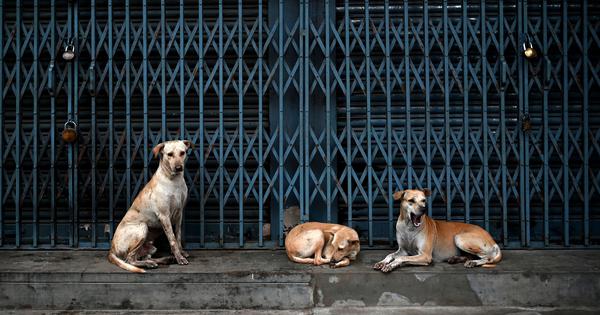
When I was growing up in a village in Rajasthan, my mother would feed the first roti she made to a dog. No matter how eager I was to eat, she would firmly set aside the first roti for the street dogs, ensuring she wouldn’t forget them as she busied herself with the day’s chores.
Feeding ants was another one of her regular acts. Villagers are typically not pet keepers. They have neither the means nor the leisure to care for them. Milk-giving creatures such as cows and buffaloes were more pragmatic choices as domestic animals. Yet they affectionately care for the dogs and cats around them.
On the way out of the village, there was a spot where dogs waited for the working men on cycles to toss them rotis. Only two better-off families had their own dogs. They were status symbols, much like their jeeps, refrigerators, and telephones. The village never had to debate the question of dogs.
Curiously, dogs were a subject of debate at Jawaharlal Nehru University when I arrived there to study two decades ago. There were dog lovers – mostly women – who would care for the dogs outside their hostels, feeding them biscuits and leftovers from the mess, and wrapping them in sweaters during the harsh winters.
They would even confront the guards who used sticks to keep the dogs from entering hostels. The women did not shy from altercations with students who kicked dogs in the dhaba.
But others did not believe that the dogs were entitled to a free pass everywhere and feared that they could pose a threat. Dog lovers were often ridiculed as fancy, urban types.
For the once-provincial boy in me, this was fascinating: English-speaking, urbane women – some of them were also revolutionary – looking after campus dogs. Cuddling dogs and reciting Urdu poetry were reliable ways to earn their friendship. I tried my hand first at poetry, then at dogs.
Campus dogs
Now living on another campus, I occasionally teach in the company of a dog at OP Jindal Global University. The presence of campus dogs in this sprawling, air-conditioned, glass-walled, and carpeted space is again a matter of debate. For a long time, dog lovers have resisted their removal; they are already collecting warm clothes for them as the polluted winter sets in this month in Sonipat in Haryana.
But to many faculty and students, dogs are more than an inconvenience – some are frightened of them due to violent experiences they may have had as children. The administration has been sensitive and has not forced any decision against the dogs.
However, since the Supreme Court on November 7 ordered that dogs be relocated from educational institutions, railway stations and other public places, the management needs to comply with these directions. In the midst of exams, students from the Animal Welfare Society spent hours with the management to relocate around 50 dogs from the campus to government-run shelters. I suppose such similar scenes are playing out on other campuses too.
The debate about street dogs has been playing out for a long time in India. Mahatma Gandhi had to discuss the issue in 1926, notes his biographer Louis Fischer.
That year, Ambalal Sarabhai, a textile mill owner, sought Gandhi’s forgiveness after he had 60 dogs “destroyed” in anger when they damaged his goods. Gandhi empathised with the “sinner” for killing dogs but asked what else could be done since, as he wrote, “a roving dog without an owner is a danger to society, and a swarm of them is a menace”.
The Ahmedabad Humanitarian Society and others challenged him fiercely. Gandhi published their letters in Young India and continued the dialogue, noting that “a humane man” would finance shelters for dogs. But if neither the state nor householders took responsibility, there could be no happy ending.
“Dogs in India,” Gandhi mourned, “are today in as bad a plight as decrepit animals and men in the land.” He added that “There is a regular science of dog-keeping in the West…We should learn it.”
Gandhi hoped that true animal lovers, as well as religious Hindus and others, would step forward to donate and manage safe places where dogs could live with dignity. Yet he discouraged feeding strays.
“Roving dogs do not indicate the civilisation or compassion of society; they betray, on the contrary, the ignorance and lethargy of its members,” he wrote. “We are wrapped in deep darkness, as is evident from our paupers, cattle, and other animals. They are eloquent of our irreligion rather than of religion.”
Beyond law
The Supreme Court has sparked widespread concern among animal lovers with its latest direction to the authorities to remove street dogs from public spaces, including schools, hospitals, bus stands, and railway stations. This is surprising, considering that only in August it had paused a blanket order to move Delhi’s street dogs to shelters.
How to deal with wandering dogs remains a pressing question in Indian cities.
Perhaps it is not the courts or the government that can resolve this. It is society at large that must take responsibility. My unlettered mother’s act of setting aside the first roti for the dogs may seem a small act, but it holds a truth larger than law: compassion begins at home, long before it reaches the courtroom.
Khinvraj Jangid is a professor and director of the Jindal Centre for Israel Studies at the OP Jindal Global University, Sonipat.
📰 Crime Today News is proudly sponsored by DRYFRUIT & CO – A Brand by eFabby Global LLC
Design & Developed by Yes Mom Hosting






